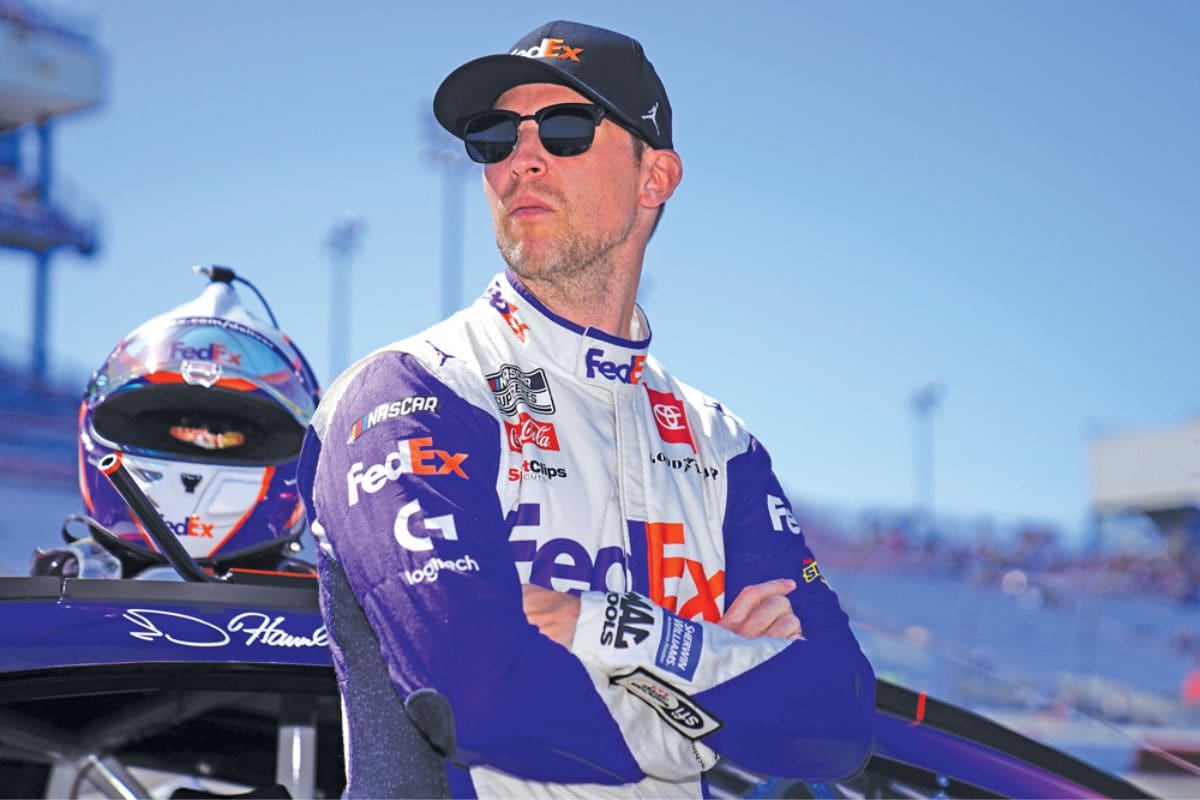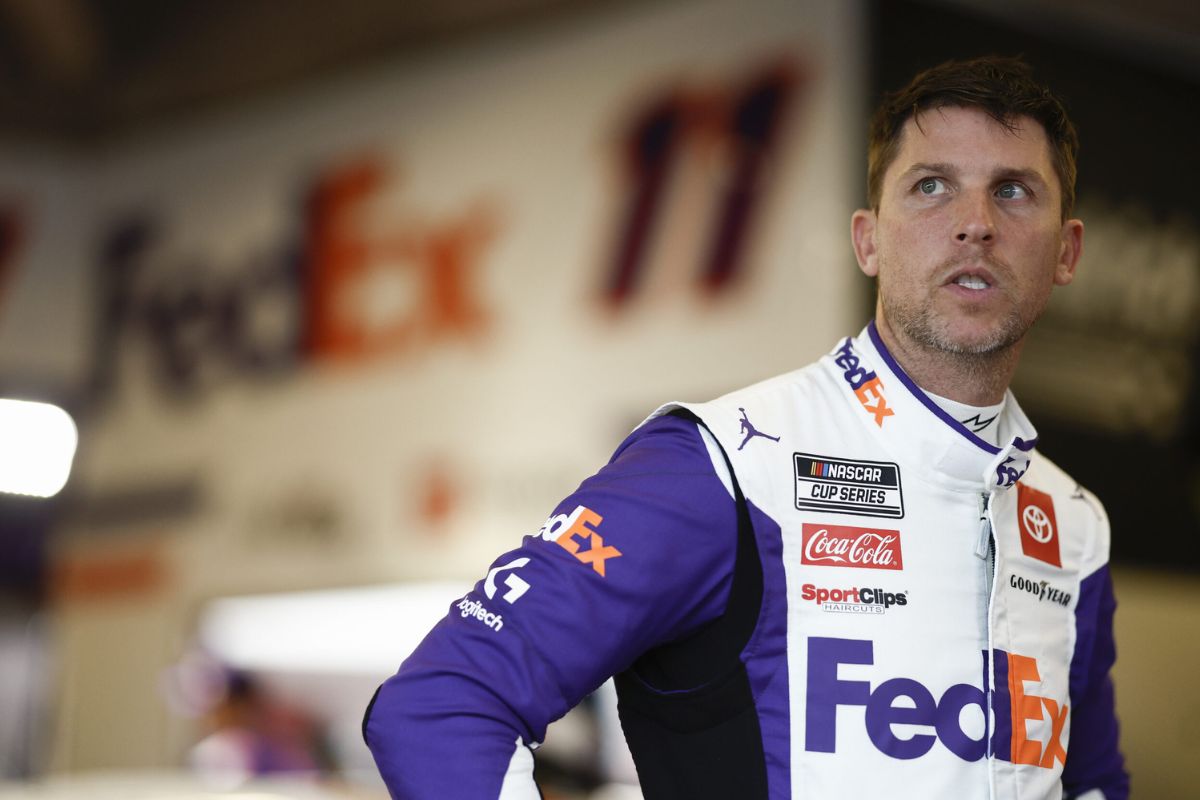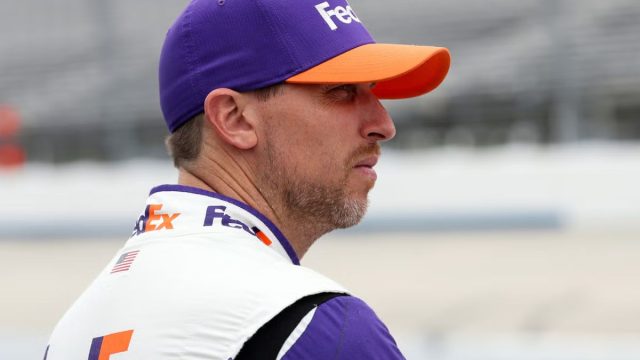Hamlin Exposes NASCAR’s False Promises: In a recent and candid revelation, Denny Hamlin has cast a stark light on NASCAR’s operational ambiguities, particularly criticizing the organization for its opaque handling of charter negotiations. His assertions suggest a significant gap between NASCAR’s public assurances and the tangible actions that follow, leaving numerous racing teams grappling with uncertainty about their future participation and strategic planning. This discord not only questions the integrity of NASCAR’s commitments but also puts at stake the trust of its stakeholders. As the racing community awaits a response, one wonders whether this will prompt a pivotal transformation in NASCAR’s governance and stakeholder communication. What repercussions might this have for the sport’s operational transparency and its relationship with team owners and drivers?
Key Takeaways
- Hamlin criticizes NASCAR for over-optimistic public statements about charter negotiation progress.
- He highlights a significant gap between NASCAR’s announcements and actual developments.
- Concerns raised about NASCAR’s internal communication and alignment issues.
- Lack of transparency from NASCAR leadership leads to distrust among teams.
- Absence of clear updates on charter negotiations affects teams’ strategic planning and operations.
Mounting Pressure on NASCAR Officials
As tensions escalate among fans, drivers, and executives, NASCAR officials face increasing pressure to implement significant changes to the Cup Series package. Criticisms are intensifying from multiple fronts, particularly focusing on the quality of racing at short tracks and the general competitiveness within the series. Jeff Gluck’s vocal disapproval underscores a growing concern that the current configurations may not be delivering the thrilling, close-quarters racing that fans expect from NASCAR’s storied venues.
The discontent is not isolated to media commentators alone. High-profile confrontations, such as Denny Hamlin’s recent clash with Speedway Motorsports Inc. President Marcus Smith, reveal a deeper unrest within the racing community itself. These incidents bring to light not just individual grievances but a collective demand for reforms that could redefine race dynamics and fan engagement. The specific issues at Sonoma Raceway, highlighted by Hamlin, illustrate broader challenges with track conditions and design that could be impacting race quality across the series.
This mounting pressure compels NASCAR officials to scrutinize the Cup Series’ technical regulations and race formats. There’s an urgent need to balance innovation with tradition, ensuring that changes enrich the racing experience without detracting from the sport’s heritage. Key considerations include aerodynamic adjustments, tire compositions, and even the potential reconfiguration of tracks to promote more competitive racing scenarios.
In addressing these concerns, NASCAR must navigate a complex landscape of stakeholder interests, from corporate sponsors and broadcasting partners to the drivers and teams at the heart of the sport. The path forward involves not just technical adjustments but a strategic vision that aligns with the evolving expectations of the NASCAR community.

Denny Hamlin’s Dismissal of Charter Negotiation Claims
Despite recent assertions from NASCAR’s executives about the near completion of charter negotiations, Denny Hamlin openly criticized these claims, labeling them as overly optimistic and disconnected from the actual progress. Hamlin’s skepticism stems from a perceived discrepancy between the public statements made by NASCAR officials and the tangible outcomes observed by those directly involved in the negotiations. His critique raises questions about the alignment between NASCAR’s internal processes and its public communications.
Hamlin, a seasoned driver with deep ties to the operational aspects of racing, suggests that the positive spin put forth by NASCAR might mask the complexities and challenges inherent in these negotiations. Such a stance from a prominent figure like Hamlin underscores the potential gaps in understanding and expectations between the racing teams and the governing body. It also hints at a larger pattern of communication issues within the sport’s administration.
The charter system, designed to solidify team ownership and facilitate operational planning, becomes a critical point of contention when discussions about its renewal and terms are perceived as being mired in corporate speak rather than actionable progress. Hamlin’s outspokenness serves as a catalytic force for bringing these issues to light, prompting stakeholders to scrutinize the efficacy and transparency of NASCAR’s negotiation processes.
Hamlin’s Criticism of NASCAR’s Transparency
Building on his previous concerns, Denny Hamlin’s critique extends to a lack of transparency from NASCAR regarding the charter negotiations. In a candid interview with FrontStretch, Hamlin voiced his dissatisfaction with the communication practices of NASCAR’s leadership, particularly targeting the optimistic narratives presented by officials such as O’Donnell. Hamlin’s assertions underline a significant discord between the perspectives of the racing teams and the governing body. He pointed out that despite public reassurances, several critical issues remain unaddressed, highlighting a gap between NASCAR’s public statements and the actual progress on pertinent matters.
Hamlin’s critique sheds light on the broader implications of such opacity in operational communications within NASCAR. The absence of clear and open negotiation updates not only stifles the trust between the stakeholders but also potentially jeopardizes the strategic planning capabilities of racing teams. The teams are left without a clear understanding of what to expect, making it challenging to make informed decisions about their future operations and investments.
Furthermore, Hamlin’s insistence on the unaddressed ‘four key elements’ raises questions about the effectiveness of the negotiation process. His comments suggest that while NASCAR may be engaging in discussions, the actual concerns and requests of the teams are not being adequately considered or integrated into the decision-making framework. This scenario not only reflects poorly on NASCAR’s commitment to collaboration but also signals a worrying trend of decision-making that might not wholly consider the sport’s competitive and financial health.

Hamlin’s Concerns About Fuel-Saving Strategies at Talladega
Denny Hamlin expressed significant concerns about the potential impact of fuel-saving strategies on the racing dynamics during the upcoming GEICO 500 at Talladega. As a veteran driver, Hamlin highlighted the criticality of maintaining track position in superspeedway environments, where overtaking can be both strategically complex and physically demanding. The introduction of fuel-saving tactics, according to him, might radically alter the traditional racing strategies employed at Talladega, potentially leading to a more cautious and less competitive event.
Here are several key concerns raised:
- Track Position Sacrifice: Drivers might need to sacrifice prime track positions to conserve fuel, compromising their competitive edge and race strategy.
- Overtaking Limitations: Reduced aggression in driving to save fuel may lead to fewer overtaking maneuvers, dulling the spectacle for fans.
- Strategic Complexity: Teams may need to recalibrate their strategies, focusing more on endurance rather than speed and agility.
- Pacing Issues: The race could experience pacing issues, with segments of the race becoming slower as drivers manage their fuel consumption.
- Fan Experience: Ultimately, the fan experience could be diminished if the race lacks the usual high-speed, adrenaline-pumping action typical of Talladega.
Hamlin’s insights into these potential changes underscore a broader concern within the NASCAR community about maintaining the integrity and appeal of superspeedway races. As strategies evolve, the balance between technical racing skill and entertainment value continues to be a critical conversation among teams, drivers, and fans alike.
Will Fuel-Saving Strategies Dampen the GEICO 500 Action?
Reflecting on Denny Hamlin’s concerns, it is vital to contemplate whether the introduction of fuel-saving strategies will indeed diminish the excitement and competitive nature of the GEICO 500 at Talladega. As Hamlin pointed out, the tendency to conserve fuel until the critical moments of the race has been a prevalent strategy in past super-speedway events. This approach potentially shifts the dynamics of the race, focusing more on endurance and tactical preservation rather than outright speed and maneuvering prowess.
The GEICO 500, known for its high-octane thrills and edge-of-the-seat overtakes, could face a paradigm shift where drivers might prioritize fuel efficiency over aggressive racing tactics. This strategy could lead to fewer lead changes and a more calculated, less spontaneous race flow. The suspense and unpredictability, elements that define the spirit of Talladega, might be undercut by periods of strategic inactivity, where drivers align more with conservation than competition.
However, it is important to consider that while fuel-saving is a tactical move, it also introduces a layer of strategic depth that can be both intellectually engaging and technically challenging. The ability of drivers and teams to adeptly manage resources while still positioning themselves for a sprint to the finish could add an intriguing dimension to the race, appealing particularly to purists and strategists within the sport’s audience.
 News in Brief: Hamlin Exposes NASCAR’s False Promises
News in Brief: Hamlin Exposes NASCAR’s False Promises
Denny Hamlin’s vocal criticisms highlight a significant transparency issue within NASCAR, particularly regarding charter negotiations. This revelation not only raises questions about NASCAR’s internal communication strategies but also about its dedication to clear and honest dialogues with racing teams.
For NASCAR, addressing these issues is vital to rebuild trust and safeguard the integrity of future negotiations and strategic decisions, thereby improving the sport’s governance and the competitiveness of its events.
Also Read: Natalie Decker’s Adopting Hamlin’s Attitude: Bold Move Ahead
